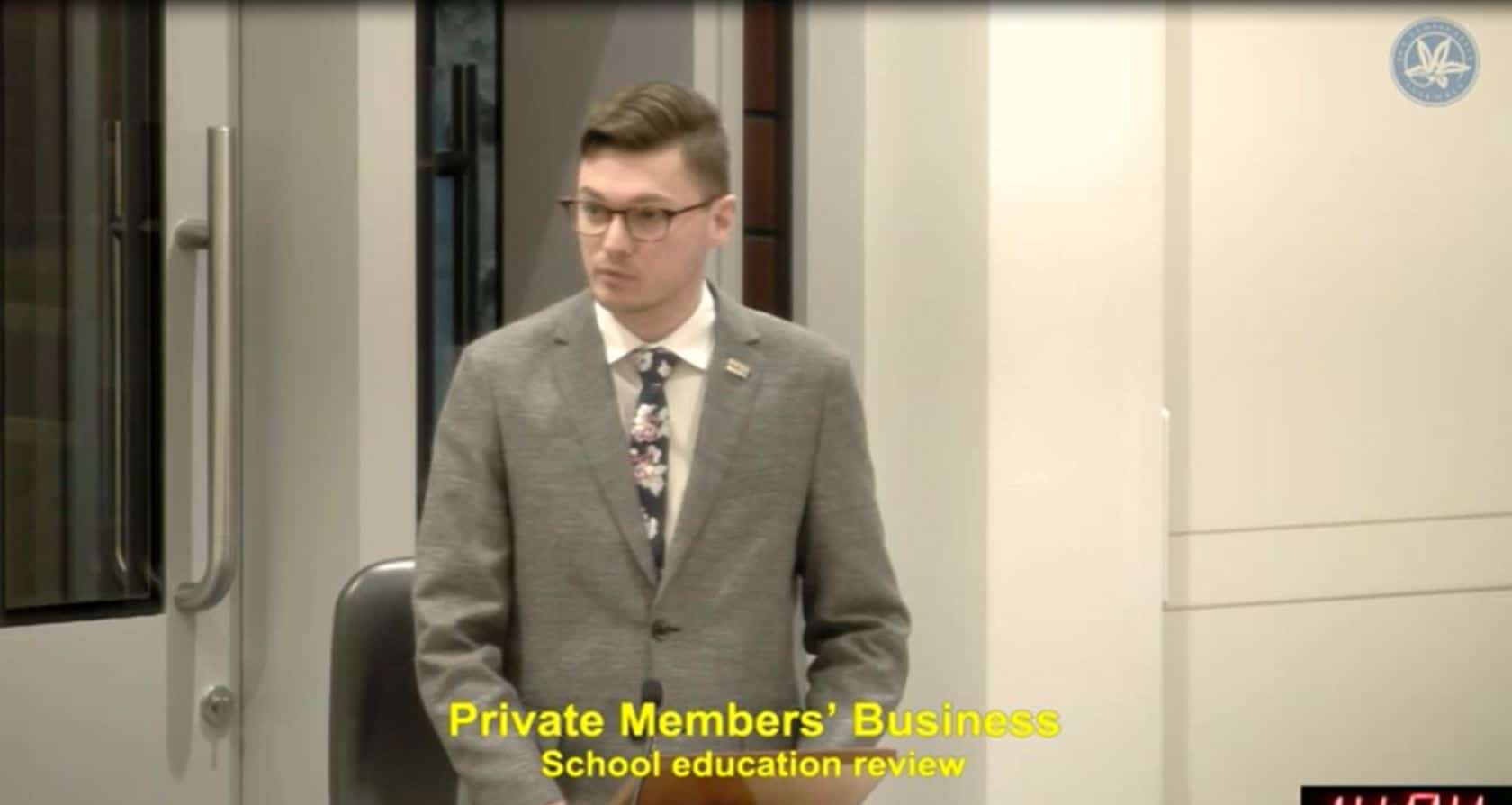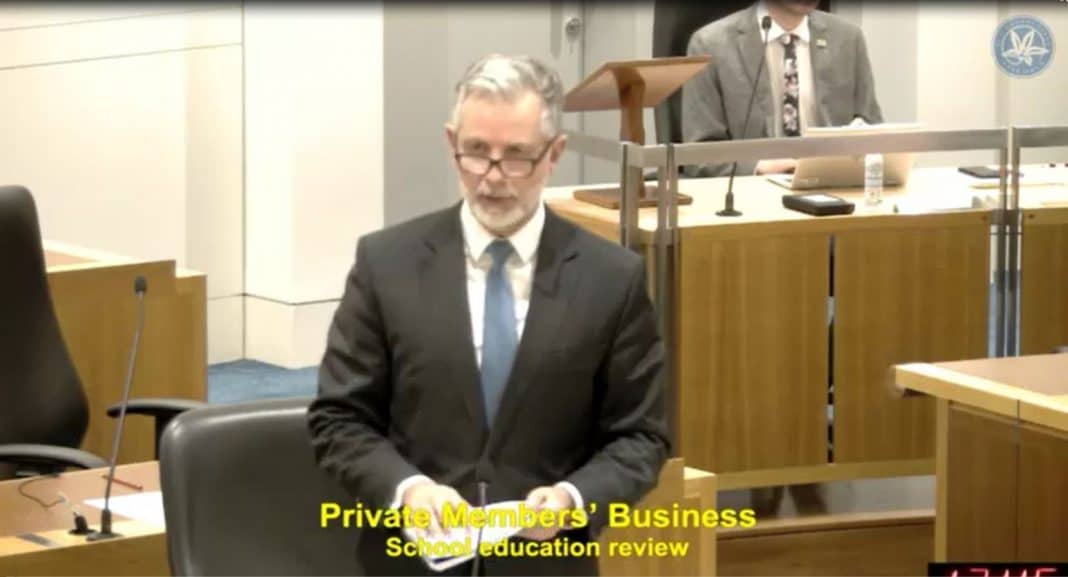The Canberra Liberals’ call for an independent investigation into the ACT education system, met what Shadow Education Minister Jeremy Hanson called an “entirely predictable, disappointing” response. The government refused.
The Liberals’ education strategy paper, released last week, said there were significant problems in terms of academic results (low literacy and numeracy), school facilities (overcrowding and ageing infrastructure), bullying, and governance and equity. Mr Hanson described the report as an analytical, evidence-based, non-ideological look at the education system, where and how it could be improved.
- Liberals give ACT Government a failing school report
- Liberals’ report criticises education strategy and school infrastructure
“It’s not going to end well for me in terms of support for the motion,” Mr Hanson said at the start of his motion. “But at the end of the day, this is a very important conversation to be having … and I intend to be having it loud and clear for the next three years.”
Greens Education spokesperson Johnathan Davis moved an amendment scrapping Mr Hanson’s motion in its entirety.
The ACT Government had conducted inquiries over the past five years – including the Education Directorate’s review on which the Future of Education Strategy is based; the Ninth Assembly’s inquiries into standardised testing and bullying and violence; and the current inquiry into school infrastructure.
The government had responded to these recommendations; Yvette Berry, Minister for Education and Youth Affairs, would update the Assembly on the government’s progress in implementing these recommendations come August.
Mr Davis said the Australian Education Union ACT and the ACT Council of Parents and Citizens’ Associations had told him they wanted the government to implement recommendations from these inquiries, rather than develop a new review.
“While the Canberra Liberals’ education vision for Canberra raises some valid concerns, we don’t believe another inquiry into public schools would be helpful,” Mr Davis quoted the ACT Council of P&Cs as telling his office.
Mr Davis’s amendment “hides from what needs to be done,” Mr Hanson claimed. “It is not going to help those hard-working teachers that we all support and those kids that we want to do the best that we can.”
Education Minister defends education system
“The ACT Government is always seeking to get the very best from our education system, and that includes regularly seeking independent expert advice,” Ms Berry said.
The Minister said that national and local school reviews showed the ACT consistently performing at high levels, particularly in school culture, expert teaching, effective pedagogical practices, and school-community partnerships.
The ACT Government was also committed to equity in education, Ms Berry said. Every high school and college student received a Chromebook (a proposal she said the Liberals had ridiculed); every public school has access to a psychologist; and the government supported Indigenous students and children with complex needs. The government would spend $12 million on an equity fund for disadvantaged families, hire 25 more youth and social workers, and introduce free early learning for children.
However, the ACT Auditor-General also published a highly critical report of teaching quality this week.
‘Conservative and offensive’ vs ‘ideological warfare’
Mr Davis said that as “the Assembly’s strongest advocate for public schools”, he could not support Mr Hanson’s motion.

“Despite his grandstanding, this motion speaks nothing to the key systemic issues our school system faces: the inequity in federal government funding for public schools, nationwide teacher shortages, and the destructive nature of NAPLAN.”
Mr Davis claimed the Liberals’ report was not academically rigorous, and made no serious academic or policy contribution. It was, he said, full of motherhood statements, and overly relied on NAPLAN data and quotes from the Canberra Times and the Australian. “It is all sizzle and no sausage.”
Mr Hanson replied that the criticism came from the ACT Auditor-General, enquiries conducted by Assembly Committees, the Grattan Institute, the Australian National University, Victoria University, and the Australian Education Union – organisations that would either be entirely neutral or not seen as allies of the Liberal Party.
“I’ve been cautious to make sure that it is a balanced view,” he said.
Mr Davis accused the Liberals of playing into the “conservative and offensive discourse” that a lack of intellectual and professional rigour among teachers led to alleged poor outcomes for students.
The report states that teaching has low ATARs and no prerequisites, and that teaching is an undervalued profession. Mr Hanson said the report was “not in any sense a criticism of the very dedicated hard-working teachers … but a critique of the system in which they work”.
The Canberra Liberals worshipped the NAPLAN testing system and relied on it to rip into the public education system, Mr Davis argued, but real education experts knew relying on it was naïve.
The AEU, he said, were “adamant in their distrust and disapproval of this out-of-touch and frankly unhelpful” testing system, which failed to provide a well-rounded understanding of cohorts’ or students’ capacity. Again, Professor Patrick Griffin (Melbourne University) had called NAPLAN a limited tool that undermined students’ confidence.
Mr Hanson replied that NAPLAN may not be the perfect system, but a testing regime was needed to provide evidence. A recent review broadly endorsed NAPLAN, he said.
Mr Davis argued that the Federal Government’s “unequitable” funding of private schools was the most significant source of inequality in the education system.
“For too long, Liberal Governments in this country have given private schools billions in extra funding, while leaving public schools underfunded and desperate for resources.” Between them, the country’s top 50 private schools, already worth $8.5 billion, would receive more than $20 billion more federal money than public schools over the next four years.
“Without significant injections of funding into our public school system from our federal counterparts,” Mr Davis said, “public schools and the state and territory governments that run them are at pains to make the systemic reforms that we already know need to occur.”
Mr Davis concluded: “Until they scrap NAPLAN, have a serious plan to increase teacher numbers in the ACT, and agree to equitable funding for public schools, the Liberals cannot be taken seriously on education.”
Mr Hanson said he was shocked and appalled by Mr Davis’s remarks. “It was not a robust debate about how we can better improve our government schools. … Mr Davis’s very unhelpful comments [are] essentially ideological warfare declared on non-government schools.”
For more news:



